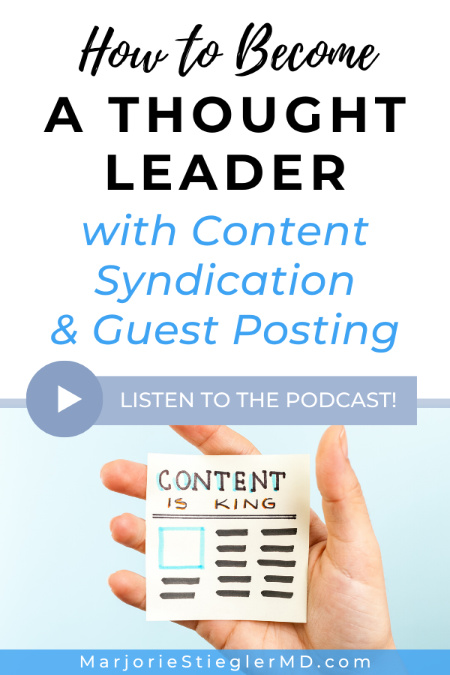You may have heard that content syndication and guest blogging is a great way to grow your credibility as an expert in your field, but you aren’t sure exactly what this looks like.
Today I’ll be breaking down everything you need to know about syndicating your existing content to increase reach and how to get started with guest blogging.
This is really an important growth strategy you can use to maximize the read of your ideal target audience and build yourself as a thought leader. And that’s the secret sauce that accelerates your career, makes your business profitable, or positions you for a successful professional pivot to leadership or nonclinical jobs for physicians.
In This Episode of The Career Rx You’ll Learn:
- The key differences between content syndication and guest blogging
- The benefits of content syndication and guest blogging
- How to start contributing content to 3rd party sites
- How to amplify your content with self syndication
LISTEN TO THIS EPISODE:
SUBSCRIBE TO THE CAREER RX PODCAST:
Want to get access to the latest podcast? Subscribe on your preferred podcast player…
Apple Podcast | Google Podcast | Spotify | TuneIn + Alexa | iHeart Radio
–
TRANSCRIPT AND SHOW NOTES
Hey there friends! Welcome to The Career Prescription podcast (aka The Career Rx). I’m your host Marjorie Stiegler.
Let’s talk about how to use third-party platforms (content syndication and guest blogging) to build your expert reputation. Using these third-party platforms to build your expert reputation and enhance your professional visibility will get you more professional opportunities.
Note: Paid content syndication is entirely different – if you’re interested in that, drop me a note, let me know and we’ll put it on the calendar. In this episode, we’re talking about unpaid content syndication and guest blogging.
Okay, first and foremost, what do we mean by content syndication and guest blogging?
What is Content Syndication and Guest Blogging?
What’s the difference? So these terms, do have separate definitions. A lot of people use them interchangeably, but there are some important differences.
Content Syndication
Content Syndication is when you re-publish content that appeared first on your website, your company’s website or somewhere else on the web.
This is generally a copy and paste. It should come with a statement that says it was originally posted somewhere else, so it’s not repurposing content.
This is truly syndication which is that the same piece of content goes out on a different platform, even if it’s identical to content that on your existing website.
Guest Blogging (aka Guest Posting)
Guest blogging is creating a new piece of content for a third party site – for a different blog/website where you are the guest writer.
The clear difference is you’ve created a new piece of content and the article that you are writing does not already appear on your website.
Guest blogging is perfect for people who do not have a current website or an active blog, or if you want to write and create content, but you don’t want to wait to launch a website.
What are the Benefits of Guest Blogging and Content Syndication?
Well, there are many and they include:
- Reaching a larger audience because of course, the platform on which you’re syndicating your content or the blog on which you are a guest already has an audience.
-
- You’ll want to select platforms that have a large audience and a large audience that is your audience – likely to be interested in what it is that you have to offer.
- You’re going to be looking for platforms that have a long history of good established authority and perhaps you’re going to be looking for some niche platforms – some that are up and coming, but very specific to your work.
- Building backlinks. Backlinks are a way to have other websites link to your website and that helps to tell Google and other search engines that your website is a worthwhile place to send people, which can help your posts show up higher on the search results page.
- Gaining personal brand recognition and increasing brand awareness.
- Establishing professional authority as an expert, having your name or your brand be associated with thought leadership.
- When a high authority (domain authority) website links to yours, Google perceives this as you having some credibility, which helps you to be associated with thought leadership for your area or topic.
- Improving website traffic with increased referral traffic and backlinks, which helps grow organic search traffic.
When you are syndicating content or guest posting, there will be at least one opportunity for you to let people know (whether it’s through a link or even just written text) where they can find you on social media or what your website is.
So, expanding your reach and social media presence helps you to grow those platforms as well.
So those are just a few of the benefits of content syndication and guest blogging which can be extremely helpful when building a professional brand and building your reputation as a leader.
Content Syndication & Guest Blogging: How To Get Started.
There are two main ways to get started with extending the reach of your expertise and content.
1. Pitch & Permission (Guest Blogging)
You’re going to need to pitch yourself and to pitch your content and get permission from that third party platform or have them accept your posts and choose to publish it.
There are some amazing places like Forbes and Huffington Post that will accept contributor content. There are many other online sources that really welcome content from contributors as well, but of course, there’s no guarantee that they will accept it.
In medicine specifically, you could contribute an article to KevinMD and SheMD.org.
So whatever it is that you are specifically interested in, if somebody already has a blog or podcast, it’s a really great idea to reach out to them. They may be more than happy to publish your information, your post, especially if they already accept guest bloggers.
Even if it’s a smaller website with a smaller audience, it’s still a great idea to contribute content if the content is niche and very targeted.
Contributing to Other Websites: What To Expect
Most websites will have a submission page with instructions for potential authors, which will tell you how to submit your content.
When you publish on other people’s platforms, they will most likely make some changes to the content, such as:
- The title
- The length of the article
- Headlines
So expect this to happen.
2. Self Syndication
Self syndication is when you re-publish your blog post on one or more of a variety of channels over which you basically have control.
There are a few large content syndication providers you can use:
Medium
One of the channels that is most important these days is Medium. Medium is a hybrid collection of professional writers, publications, bloggers and regular people who want to submit content.
You don’t need permission to post on medium, you simply need to set up an account.
- It’s free for writers and that’s very valuable for you if you want to get on there and post.
- It is a paid subscription platform for readers. So there is a slight disadvantage there, but it’s still wildly popular. They get a lot, a lot of readership and the paywall is small, at just a few dollars a month.
- They have an incredible import tool. So if you have an existing blog, it’s really easy to import all of your content, including your images, links and so on, and just have it shared out on medium.
You can set up your Medium profile to link to your social media accounts and you get that attribution statement back to your primary blog.
What Does Self Syndication Mean for SEO?
Without getting too technical, search engines really like to know the source of the original content. Medium automatically applies the source (the right attribution) to your syndicated content so you don’t have to do anything.
It’s a good thing for Google and other search engines to know that your website is the original sole source of your post that’s been syndicated on Medium or anywhere else.
If you’re publishing with third parties that you have to pitch and get permission, you’ll need to talk to them about adding the right meta-tags to ensure they are identifying your website as the original source.
SlideShare
Another great place to post is SlideShare.
With SlideShare, instead of having to scroll through a lot of text, you can just flip through a slide deck or some other type of visual. You get the same type of information but much more quickly and in a shareable format.
SlideShare is owned by LinkedIn, so it’s connected to your professional account.
This really helps to build professional authority and credibility as an expert.
- You simply upload your slide decks, infographics, videos and documents
- People can look at them.
- You can customize your settings so there is a full transcription of your content or you can add a text if you wish.
- People can clip it and download the content (You can also turn that feature off if it’s not your preference).
SlideShare is a really great way to establish your credibility because it also shows that you present and create a specific type of content, which is different from just writing a blog.
Great content to showcase on SlideShare is speaking engagements as this can greatly boost your professional authority.
Quora
Quora is a question and answer platform. Many people use Quora to ask for advice, feedback and tips. Users answer questions with their professional opinions. If you give great answers, there is an upvote system that lends even more credibility to whatever you have said.
Quora allows you to not only give that authoritative answer but to engage and have conversations with your potential target audience. These people might be interested in coming to your blog, inviting you to speak, or even hiring you.
Quora also has a blogging platform, so you can post actual articles, which can be syndicated articles that you have already written on your own website.
Think of Quora like a guest blog host and a syndication platform in one. The especially good news about Quora is their blogging platform already has a lot of search engine authority and recognition.
Benefits of Quora:
- Great SEO authority built-in. Unlike your own website, which is maybe not as well recognized by Google, you already have a search engine optimization boost due to Quora’s SEO authority.
- Readers do their own searches, which makes it easier for them to discover your content.
LinkedIn has two main ways to syndicate content.
- You can share your blog posts as an update – link to the URL of your blog post.
- Or you can use the native LinkedIn blogging platform to publish brand new content or syndicated content.
With both of the above options, you can engage your LinkedIn followers by asking them questions or providing comments about the topic of the content.
This is a great opportunity to connect with people in your network and look excellent for potential job prospects. Just make sure that your settings are public so that they can be found by search engines.
Video & Podcast Platforms
YouTube is one of the best video platforms out there, but of course, you can also use Facebook Live and Instagram TV.
As for podcasting, your episodes can be uploaded to various popular platforms such as Apple Podcasts and Google Podcasts.
If you have a blog, it’s a great idea to embed your podcasts and videos into your website.
Keeping all of your content together on your website increases user engagement and allows your readers to experience ALL of your content.
To Amplify your Facebook Content you should have a Business Page.
You can then publish your Facebook Live videos on this page and promote your long-form blog content. Whether it’s content on your website, a guest post you’ve written or content you want to share from a syndicated platform.
Your Facebook business page is a place where you can showcase your thought leadership and engage with your readers.
Another great way to interact with your Facebook followers is to share 3rd party content from authoritative publications and related blog posts. This encourages conversations and builds likeability and trust.
There’s another potential benefit of sharing other content by tagging the authors of those posts. The author will be notified and they can share with their Facebook followers. This means more eyes on your page and content.
Content Syndication & Guest Blogging: Recap
So, why do we want to be focusing on content syndication and guest blogging?
- To reach a larger audience.
- Have an offsite distribution network, meaning off of your own website, getting the word out there.
- Distribute content more widely.
- Increase backlinks to your original posts.
- Build brand recognition and authority.
- Showcase your thought leadership on other high authority websites.
- Expand your social media presence.
- Increase traffic for your website.
If you don’t already have a website but you want to start getting your name out there, guest posting and content syndication is for you.
Come up with some original content and go ahead and publish on these platforms.
Before you get started I have one closing thought…
If you’re going to start creating content before you’ve established your website it is really well worth it to establish some other kind of digital “homebase”.
This could be a Facebook business page or a LinkedIn account. This way you can direct people back to this space so people can find and connect with you.
For more tips, be sure to check out The Career Rx Episode 2 – How To Build a Stellar Online Presence – and we’ll continue to get into how to make that even better with professional branding as we go forward.
Grow your following, establish your reputation, get increased social media presence using LinkedIn or Facebook or some other type of platform as your home base. Just make sure that it is something everybody can access – not a closed platform or private group.
–
Thanks for joining me on this episode of The Career Rx Podcast.
Please be sure to subscribe and leave me a review on Apple Podcast, Google Podcast or whatever podcast player you’re using to listen today. Also, be sure to send me your questions so that I can answer them and give you a shout out on a future episode.
Bye for now,
Marjorie










